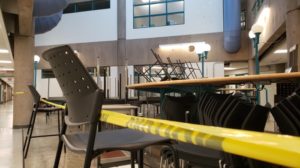I’m a pretty paranoid person. I’m the guy my doctor snickers at when they see me in the waiting room. That’s not a lump, they must be thinking. It’s your big toe.
My guesses about how lockdown would impact me long term were off the mark. It had less to do with the actual fear of getting sick, touching a door knob, or giving someone a handshake and more to do with a tepid fact stark in its simplicity: I’ve forgotten how to deal with life, with being part of a community, a world, and a species.
Recently, I’ve taken on a job as a social worker, and the day-to-day duties of the job are the polar opposite to those of being a writer in a lot of ways. I go into the community, interact with many people in a day—sometimes in close quarters—with no breaks or expectations of quiet tranquility typical in the workday of a writer, a workday that right now would be nothing but the summer heat and the tap tap tap of fingers on the keyboard. And, most days, the life of a writer is more of a memory than I’d like it to be.

But in another sense, social work and journalism are linked, which is perhaps why I know of more than a couple of people who’ve done both at the same time. I’m still talking to people, hearing their stories, and, sometimes, even writing it down in the pages of a leather-bound journal.
Helping those who need it is incredibly rewarding, but I find myself relearning, like a feral cat, how to be among my kind. My heart pounds in my throat as I get ready to leave—or sometimes even just think about leaving—the house. I’m unreasonably (and frankly, ridiculously) exhausted at the end of the day. It’s the way the first few days back at work after vacation feel… all the time. Every day.
I still sometimes put my hand behind my shirt before I touch a doorknob, and the thought of having multiple people in my personal-space bubble (which still hasn’t shrunk back to its pre-pandemic size) is a little unsettling.
I still sometimes think of the invisible spit bubbles flying from people’s mouths as they speak, which makes me shudder is disgust. But this is all new: I was never a germaphobe before.
With all that in mind, I still come back to a simple lesson from Psych 100: exposure therapy can be effective. So, today, as I wash my hands, mask up, and get ready to go out into the world for an afternoon shift in the community, I remind myself to just keep going. Push through the breakdowns, the sweat, the pounding heart, and the crippling fear at the thought of needing to be in public. It’s irrational. It’s sick. But it also makes sense—after 16 months of living and working from home in one giant, messy, hot, room, I am only now just starting to grapple with how harmful it was. Of course, it was the lesser of two evils in March 2020, but in August 2021, it’s long-standing trauma—I’ve accepted this—that will take time to overcome and breathe away. That doesn’t mean I’m weak. It means… well, I’m not quite sure what it means, but it’s there, and I know it’s added another layer to keeping my mental health in check.
